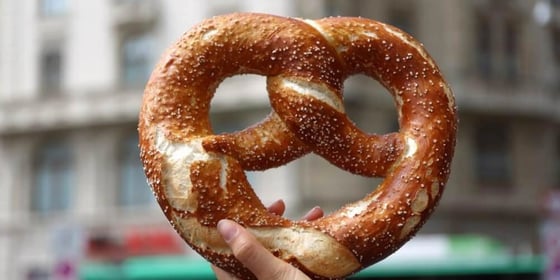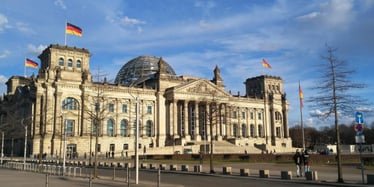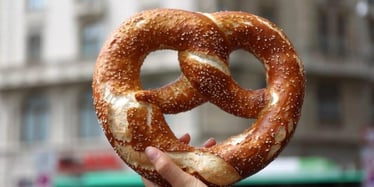What is Germany known for?

Contents
When you think about Germany, what comes to mind?
Maybe it's the sound of clinking glass beer steins in tented festivals, or the smooth acceleration of a premium car on the Autobahn?
Or is it the way the River Rhine snakes its way through picturesque castles, each one more beautiful than the last?
Keep reading to find out all about what German is known for.
Expatrio Value Package
Simplify your move to Germany with Expatrio's Value Package! Get your mandatory Health Insurance + Blocked Account + free Expatrio Bank Account, and other free benefits!
Germany is known for its beer festivals, hedonist techno scene, and delicious bread. But what else can you expect from life in Germany? When you start your own residence in Germany, you will discover many secrets that are just waiting to be uncovered. With all of their achievements, German people have plenty to be proud of. There are many areas where Germany has made its mark on the world, and where it still stands out among nations. So let's take a look at some things associated with Germany that everyone needs to know about.
Get to know Germany!
Types of bread
mil
Liters of beer drank at Oktoberfest
mil
Cars produced per year
Castles
%
of the Autobahn has no speed limit
What is Germany known for?
What comes to mind when you think about Germany?
In our video, you can find out all about the most famous features of German culture, like beer, castles, soccer, and much more!
German Beer
Beer plays a major role in German society, and no country has a more sophisticated and diverse brewing sector
This has been the case ever since the first beer laws were passed, over 500 years ago. Known as the , these laws apply in most parts of the country, specifying what can - and can't - go into genuine beers. Because locals appreciate quality above all else, the brewing industry is usually happy to comply. And that's great news for all residents.
If you have a taste for beer, there are some standout varieties that every German resident should try at least once.
has been making irresistible white beers (W±đľ±Ăź˛úľ±±đ°ů) since 1634, and its refreshing, light beers are spreading across the globe.
Based in Erding, is the world's largest producer of wheat beers, and its dunkel (dark) varieties are unmissable.
with a big Oktoberfest presence. Look out for its Märzen beer, which appears in the Fall and packs a punch.
ąó°ůĂĽłó is based in Cologne, where it creates a beautiful Kolsch beer - less fizzy than south German lagers and adds a dash of fruity sweetness to the mix.
Dusseldorf's Uerige makes a dazzling Altbier, which uses longer fermentation periods and results in a smooth, dark variety that's all-too-easy to drink.
That's just a small sample of the varieties for you to test! Head to our in-depth German beer guide for more information about local brews and where to find them.
Expatrio Value Package
Simplify your move to Germany with Expatrio's Value Package! Get your mandatory Health Insurance + Blocked Account + free Expatrio Bank Account, and other free benefits!
Baking Bread
What food is Germany known for? Well, for some it might be sausages, schnitzels, or rich pastries. But for real Germans, one food is more important than the others: bread.
Bread is right at the heart of German identity, and bakers are a core component of almost all communities. Germans despise cheap, inferior loaves. For them, bread should taste of the earth and the grains that it came from, and artificial additives or shortcuts are out of the question.
Every region has its specialties, so you might be thinking, how many different types of bread does Germany have? Well, , more than 3,000 different bread types are baked and sold every day in Germany!
The country is famous for its dark breads (Schwarzbrot) that are made from rye grains, and are often flavored with cardamom or caraway seeds – creating a delicate aroma and a delicious accompaniment for pickles, cheese, or just fresh butter.
Then there are µţ°ůöłŮł¦łó±đ˛Ô: crusty rolls studded with seeds that are often paired with bratwurst to delicious effect. Salt-coated pretzels are a common sight, especially in Bavaria, while northern Germany tends to favor heavier, rustic Kastenbrot. Exploring the different varieties is a culinary adventure in itself.
And don't forget to try sweeter delights at your local bakery. Germany is famous for its Stollen (a Christmas treat), while ±áö°ů˛Ôł¦łó±đ˛Ô offer a delicious take on croissants.
German Bakeries
In Germany, bakeries are divided into Konditorei and Bäckerei. Bäckerei tend to specialize in breads and other savory foods. Konditorei are all about pastries and sweets. So make sure you know the difference before diving into Germany's baking scene.
German Castles
It's hard to imagine a postcard from rural Germany without an enchanting castle somewhere in the background
When it comes to sightseeing, Germany has a lot to offer! When you cycle the Rhine Valley or explore Bavaria, the vast amount of medieval and more modern castles is almost overwhelming.
Many of Germany's castles are iconic. For example, towers over the town of Hohenschwangau. Built as a retreat for Richard Wagner by the (possibly mad) Bavarian king Ludwig II, it's an incredible architectural achievement, attracting 1.3 million visitors annually.
When you visit the castle, you'll probably be reminded of Disney's Sleeping Beauty. And that's no coincidence, as Disney modeled its creation on Ludwig's masterpiece.
Elsewhere, you'll find stunning castles that are rich with history. Eisenach's Wartburg Castle famously sheltered protestant reformer Martin Luther in the 1520s; Hohenzollern Castle was home to the Imperial Royal Family until 1918; while Heidelberg's ruined castle could hardly be more romantic.
Some castles date back 1,000 years or more. Others were built in the 19th century as playthings for princes and kings. This has left a unique mixture of Gothic ruins and outlandishly decorative castles, and most are open for visitors to tour. Find out more about the German architecture and its beautiful buildings.
Are you interested in sightseeing in Germany? We have collected the most relevant sights in Germany!
Expatrio Value Package
Simplify your move to Germany with Expatrio's Value Package! Get your mandatory Health Insurance + Blocked Account + free Expatrio Bank Account, and other free benefits!
Planning a trip
If you are planning a trip to popular spots like Neuschwanstein, booking in advance is highly advisable, as prices can spike for on-the-spot purchases.
German Cars & Autobahn
Ever since Gottlieb Daimler and Karl Benz pioneered internal combustion engines, Germany has had a love affair with the automobile
This has resulted in numerous brands and models that have a justifiably famous global reputation. You've probably heard of the major brands. There's Mercedes Benz, which is a synonym for premium luxury and is the brand of choice for executives in the world's business centers. There's BMW, which mixes elegant design with performance engines in one seductive package. Audi's autos are known for their reliability and engineering prowess. Porsche is a legendary name in high-end sports cars. Ever since the 911 appeared in 1963, it has featured in Bond movies and gained a worldwide reputation for mixing speed and reliability.
Finally, Volkswagen (VW) captured hearts across the world with its Beetle – one of the first affordable family cars, and famous for its rear engine design. And it also produces camper vans that can be found in national parks and campsites from Canada to Australia.
This engineering prowess has fed into a national love of motorsports. Nobody symbolizes this better than racing in the 1990s, winning 7 world championships.
German Car Museums
If you love cars, be sure to visit the Mercedes Benz and Porsche Museums in Stuttgart - a city which offers a great short break destination for any automobile fans.
How Cars Have Become A Core Part of German Identity
When you live in Germany, it's clear how proud locals are of their automotive industry. No country can match Germany's reputation for precision engineering and dependability. And few have taken cars into their hearts so totally.
The Autobahn network knits together German cities, providing quick connections (and famously allowing very high speeds in the fast lanes). German cities are well designed for drivers, with sensible layouts and parking systems.
Cars also appear in German popular culture. For instance, it's no accident that electronic music pioneers Kraftwerk entitled their most famous album Autobahn.
German Festivals
German
People in the country love to get together for a good time, often in city-wide festivals that turn quiet neighborhoods into hubs for music, dancing, food, and beer.
In the case of , we're talking about serious quantities of beer. You might be wondering how much beer is consumed during Oktoberfest? In 2023, the.
Despite the name, most of the festival doesn't take place in October - so don't mix up your travel plans. The festivities start in mid or late September and run into October, offering over 2 weeks of raucous entertainment. The festival takes place in numerous German cities, but Munich's event is the biggest, drawing around 6 million visitors from around the world.
Over that period, the 100-acre Theresienwiese in Munich's Ludwigsvorstadt-Isarvorstadt district completely transforms into the world's largest party.
A Quick History of Munich's Biggest Party
It all started back in 1810 when Bavarian Crown Prince Ludwig married Princess Therese von Sachsen-Hildburghausen. The October marriage was swiftly followed by a huge celebration, featuring horse racing and music. It was such a success that Munich replicated the experience in 1811, and the city hasn't looked back.
By the late 19th century, the event had blossomed, adding a large funfair, an agricultural show, and massive drinking tents to its appeal. With industrialization progressing, the festival also started to embrace traditional Bavarian ways of life, with staff and guests sporting Lederhosen and Dirndl dresses.
The result is a spectacle that is both modern and nostalgic. It's a time when locals celebrate Bavaria's distinctive culture, but also a global meeting point for party-goers.
Dive into the World's Largest Beer Tents
Perhaps most importantly, the event has become a showcase for southern Germany's superb beers. Tents at the festival are sponsored by major breweries like Paulaner, Löwenbräu, Hacker, or Augustiner-Bräu. And by tents, we don't mean cramped marquees. Capable of housing 6,000 attendees, these are some of the biggest tents ever erected.
They also offer different forms of entertainment. For instance, the ´ˇ°ůłľ˛ú°ůłÜ˛őłŮ˛őł¦łóĂĽłŮłú±đ˛Ôłú±đ±ôłŮ hosts Germany's national crossbow firing competition, the µţ°ůäłÜ°ů´Ç˛ő±ô hosts Rosa Weisn – the event's premier gay party – while the Hacker tent is known for its Schlager music.
German Drinking Songs
The beer tents aren't like normal bars or pubs. Don't be surprised if your neighbors start singing lively German drinking songs. If they do, why not join in? Plenty of websites offer primers on the main drinking songs, and locals will happily teach you the tunes.
Foods that Visitors Need to Try
Wherever visitors end up, they can expect table service and a feast of local cuisine. Spit-roasted chickens, roasted ham hock, cheesy noodle bowls (°Ă¤˛ő±đ˛ő±čäłŮłú±ô±đ), and a galaxy of sausage varieties are all available – tempting visitors at every turn.
Pork lovers will adore Schweinebraten, which involves roasting pork with rich beer sauces. There are marinated fish skewers (Steckerlfisch). And, above all, there are pretzels. Known as Brezel in Bavaria, pretzels are present everywhere, often in gigantic forms. There's no better way to complement a giant Krug of beer.
How to Enjoy the Festival With Kids
If this makes Munich's premier festival sound like a completely adult event, don't worry. While there's certainly a lot of adult fun to be had, the festival has become a hugely popular one with families as well.
One reason is that admission to the festival grounds is completely free, as is admission to all of the tents. There's no pressure to stay in one place. Families can roam through tents, fairgrounds, playgrounds, music spaces, and markets at their leisure. Everything is laid-back and there's hardly ever any trouble.
The fairground remains a major attraction, offering more than 80 rides, from roller coasters to bumper cars. And children are welcome in the beer tents as well, where the atmosphere is almost always friendly and good-natured.
Experience Germany's Carnival
German festivals aren't all about beer tents and Lederhosen. The country also has a lively carnival tradition, and it includes some unmissable events.
Known as carnival celebrates the beginning of Lent, and it does so in style. In Braunschweig, locals scare away the devil on carnival Sunday, while Berlin uses Fasching as an excuse for a massive spring-time party. Just stay clear if you are afraid of clowns, who tend to take center stage.
In Cologne, you might find comedy orators giving Buttenreden (barrel speeches), you'll definitely find huge street parties, along with the spectacular Rose Monday parade. And in ¶ŮĂĽ˛ő˛ő±đ±ô»ĺ´Ç°ů´Ú, you can watch the city's women symbolically "storm" the town hall on Women's Carnival Day in late February. There are distinctive events in February and March across Germany, so check event listings near you.
A Country that Loves Music Festivals
Finally, Germans simply love gathering to hear live music. And we don't mean Oompah bands and David Hasselhoff (although for sure, the Hoff gathers crowds wherever he goes). Germany actually hosts some of Europe's premier music events.
For example, Bayreuth's Wagner Festival is world famous, and its performances of the Ring Cycle or Tannhauser are unforgettable.
On a completely different note, Rock am Ring brings metalheads from across Europe to Mendig in June, while techno fans flock to Lärz in August and September for the epic Fusion Festival - held at a disused airfield. And for pure dance music bliss, Frankfurt's Commerzbank Arena is the place to be when World Club Dome hits the town in June.
That's not all. From Indie events like and , all styles of music have their own unique events in a country that adores live music.
German Football
Learn more about ąółÜĂź˛ú˛ą±ô±ô - which is comfortably Germany's number one sport
Ask any soccer fan what Germany is famous for, and they will instantly launch into a list of superstars of the game. ąółÜĂź˛ú˛ą±ô±ô is Germany's number one sport, and the nation has done pretty well on the global stage. Over the years, the German team has won 4 World Cups and 3 European Championship. Only Brazil comes close in terms of international victories.
The German national team (known as Die deutsche Nationalmannschaft locally) often gathers most of the attention. Thanks to stars like Franz Beckenbauer, Gerd Muller, Lothar Matthaus, and Jurgen Klinsmann, that's hardly surprising.
Whenever the Nationalmannschaft is in action, the whole country watches, and their opponents start to worry. The German national team is known for their teamwork, application, and individual skill, making them strong competitors in major tournaments.
However, don't forget about domestic league football. The Bundesliga is also world renowned for its atmospheric stadiums and family-friendly attitude (not to mention the affordable ticket prices).
European Cups
Bayern Munich and Borussia Dortmund have won multiple European Cups, but it's really enjoyable to sample the experience at smaller teams, where fans can get much closer to the action. Buying tickets through club websites is usually the best way to organize a visit.
Famous Germans
When people ask what is Germany best known for, some standout individuals often spring to mind
When people ask what Germany is best known for, some standout individuals often spring to mind
A quick run through some of the most famous German celebrities would put most nations to shame. For instance, in science, the country gave birth to and the nuclear age. Johannes Kepler discovered the laws of planetary motion. Physicists like Max Planck and Werner Heisenberg helped to launch the age of space exploration, while Fritz Haber and Carl Bosch helped to feed the masses by discovering ways to synthesize ammonia fertilizers.
Others changed history through culture. J.S. Bach's organ works revolutionized classical music and still bewitches modern music fans. Goethe and Schiller created extraordinary dramatic works, while Max Ernst and Berthold Brecht played leading roles in the 20th-century Avant Garde.
So what are Germans known for? Perhaps the question is, where haven't Germans made a mark? From science and literature to music, philosophy, art, film, activism, and sport, Germany has produced world-famous icons.
Expatrio Blocked Account
Want a fast, easy, and secure Blocked Account? Open yours online while still in your home country.
This might also be of interest to you

German Political System
When you move to Germany, getting to grips with how politics works is absolutely essential, especially for those who choose to become German...
